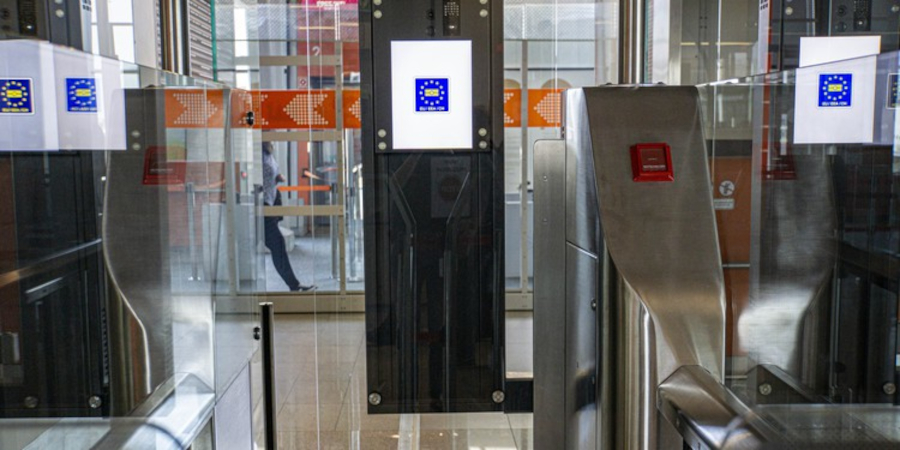The stability and functionality of the EU’s huge biometric database still cannot be tested. The German government adjourns the launch of the system for an undetermined period of time.
The full introduction of the new EU Entry/Exit System (EES), which requires fingerprints and facial images from all travellers at external borders, is likely to be postponed again. Last week, the British Guardian reported that France, Germany and the Netherlands are not ready for the planned launch on 10 November. In response to an enquiry from the newspaper “nd”, the German Ministry of the Interior has now put this in more drastic terms: According to it, the three governments had refused to “make any statement at all” on the possible launch date.
The necessary stability and functionality of the EES central system is “still not in place today”, the statement explains. As a result, it is still impossible to carry out the necessary final tests of the overall EES system in each member state. The postponement by one week to 17 November envisaged by the EU Commissioner for Home Affairs, who is still in office, is therefore also in question.
Delay increases costs
The EES stipulates that non-EU citizens must provide four fingerprints and a photo of their face when they enter the Schengen area for the first time. Future entries and exits will then be biometrically verified. Travellers for the Schengen area with visas must provide this data at a consulate when applying. The EES is therefore aimed at third-country nationals with whose countries of origin the EU has concluded agreements for visa-free travel for a period of up to three months. For this group of EU foreign nationals, the submission of biometric data was not previously required.
The EU Agency for the operational management of large-scale IT systems (eu-LISA) is responsible for providing the EES central system. The agency blames the suppliers for the slow start. The tender for €142 million was won in 2019 by Atos with a consortium consisting of IBM and Leonardo. The delay has led to a significant increase in costs, which are said to have already totalled 30 million euros last year.
The fact that eu-LISA is not demanding financial compensation from the defaulting contractors is possibly a conflict of interest: Agnès Diallo, who according to eu-LISA previously held “a number of management positions” at Atos, was appointed as the new Director of the agency at the beginning of 2023. After just over a year in office, Diallo resigned, and in August eu-LISA’s Administrative Board appointed an interim director until a new one was elected.
The introduction of the EES was already planned last summer, but was postponed due to France’s concerns about the Rugby World Cup and the Olympic Games. The date was then set for 6 October this year, but was later moved to November to avoid disruption during the school holidays in EU countries.
Together with France and the Netherlands, Germany represents 40 per cent of the passenger traffic affected by the Entry/Exit System. The countries support its introduction in principle, as they believe it should increase security. However, France is also concerned about congestion in Dover, where British and French border controls take place. There are fears that waiting times of up to 14 hours could affect the movement of lorries, cars and buses.
Private jet lobby sounds the alarm
Significantly longer border controls are also expected at international airports. Together with the EU border agency Frontex, the German Federal Police have therefore developed an app to shorten these waiting times. Travellers can voluntarily state their planned length of stay, the reason for their journey and their intended destinations in advance. They should also provide information on the amount of cash, credit card and travel health insurance. The app uses the information to create a QR code that travellers can present at the border crossing.
In its statement on the delay to the EES, the German Ministry of the Interior also refers to problems at smaller airports. In the summer, the private jet lobby raised the alarm because the introduction of the EES would soon mean that also all business travellers from Non-Schengen countries would have to undergo mandatory checks. This would mean that the German Federal Police would also have to be stationed at privately operated airports. The costs for this would be imposed on the operators.
According to the German government, it is “currently unable to make any statements on the further timetable” for the launch of the EES, as this is the responsibility of the EU Commission. In Germany, however, there is close and trusting cooperation between the responsible authorities and the aviation industry on this topic. With a “coordinated information strategy”, they are prepared for the imminent introduction of the system, the Ministry of the Interior told “nd”. However, there has been no sign of this so far.
Published in German in „nd“.
Image: Border crossing gate in a pilot project (Frontex).





Leave a Reply